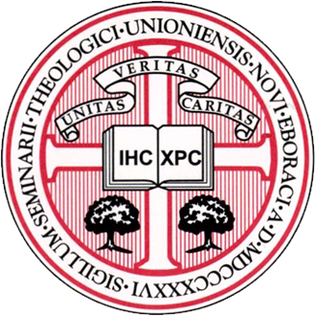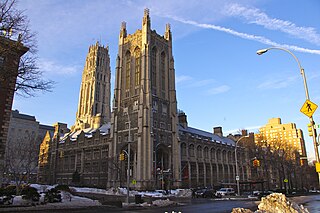
Union Theological Seminary in the City of New York is a private ecumenical liberal Christian seminary in Morningside Heights, Manhattan, affiliated with Columbia University. Columbia University lists UTS among its affiliate schools, alongside Barnard College and Teachers College. Since 1928, the seminary has served as Columbia's constituent faculty of theology. In 1964, UTS also established an affiliation with the neighboring Jewish Theological Seminary of America. Despite its affiliation with Columbia University, UTS is an independent institution with its own administration and Board of Trustees. UTS confers the following degrees: Master of Divinity (MDiv), Master of Divinity & Social Work dual degree (MDSW), Master of Arts in religion (MAR), Master of Arts in Social Justice (MASJ), Master of Sacred Theology (STM), Doctor of Ministry (DMin), and Doctor of Philosophy (PhD).

Womanism is a feminist movement, primarily championed by Black feminists, originating in the work of African American author Alice Walker in her 1983 book In Search of Our Mothers' Gardens. Walker coined the term "womanist" in the short story "Coming Apart" in 1979. Her initial use of the term evolved to envelop a spectrum of issues and perspectives facing black women and others. Walker defined "womanism" as embracing the courage, audacity, and self-assured demeanor of Black women, alongside their love for other women, themselves, and all of humanity. Since its inception by Walker, womanism has expanded to encompass various domains, giving rise to concepts such as Africana womanism and womanist theology or spirituality.

James Hal Cone was an American Methodist minister and theologian. He is best known for his advocacy of black theology and black liberation theology. His 1969 book Black Theology and Black Power provided a new way to comprehensively define the distinctiveness of theology in the black church. His message was that Black Power, defined as black people asserting the humanity that white supremacy denied, was the gospel in America. Jesus came to liberate the oppressed, advocating the same thing as Black Power. He argued that white American churches preached a gospel based on white supremacy, antithetical to the gospel of Jesus.
Women as theological figures have played a significant role in the development of various religions and religious hierarchies.

The Vanderbilt Divinity School and Graduate Department of Religion is an interdenominational divinity school at Vanderbilt University, a major research university located in Nashville, Tennessee. It is one of only six university-based schools of religion in the United States without a denominational affiliation that service primarily mainline Protestantism.
Mercy Amba Ewudziwa Oduyoye is a Ghanaian Methodist theologian known for her work in African women's theologies and theological anthropology. She is currently the Director of the Institute of African Women in Religion and Culture at Trinity Theological Seminary, Ghana. She founded the Circle of Concerned African Theologians in Ghana in 1987 to promote the visibility and publishing agenda of African women Theologians.
Africana womanism is a term coined in the late 1980s by Clenora Hudson-Weems, intended as an ideology applicable to all women of African descent. It is grounded in African culture and Afrocentrism and focuses on the experiences, struggles, needs, and desires of Africana women of the African diaspora. It distinguishes itself from feminism, or Alice Walker's womanism. Africana womanism pays more attention to and focuses more on the realities and the injustices in society in regard to race.

Katie Geneva Cannon was an American Christian theologian and ethicist associated with womanist theology and black theology. In 1974 she became the first African-American woman ordained in the United Presbyterian Church (USA).
Stacey M. Floyd-Thomas is an American author and educator. She is associate professor of ethics and society at Vanderbilt Divinity School and the Graduate Department of Religion at Vanderbilt University in Nashville, Tennessee. Floyd-Thomas is a Womanist Christian social ethicist whose research interests include Womanist thought, Black Church Studies, liberation theology and ethics, critical race theory, critical pedagogy and postcolonial studies.

Jacquelyn Grant is an American theologian, a Methodist minister. Alongside Katie Cannon, Delores S. Williams, and Kelly Brown Douglas, Grant is considered one of the four founders of womanist theology. Womanist theology addresses theology from the viewpoint of Black women, reflecting on both their perspectives and experience in regards to faith and moral standards. Grant is currently the Callaway Professor of Systematic Theology at the Interdenominational Theological Center in Atlanta.
Marcia Y. Riggs is an American author, the J. Erskine Love Professor of Christian Ethics, and the Director of ThM Program at Columbia Theological Seminary, a womanist theologian, and a recognized authority on the black woman's club movement of the nineteenth century. She was one of six Luce Scholars named by the Association of Theological Schools in the United States and Canada (ATS) and The Henry Luce Foundation, Inc. as Henry Luce III Fellows in Theology for 2017–2018.
Delores Seneva Williams was an American Presbyterian theologian and professor notable for her formative role in the development of womanist theology and best known for her book Sisters in the Wilderness: The Challenge of Womanist God-Talk. Her writings use black women's experiences as epistemological sources, and she is known for her womanist critique of atonement theories. As opposed to feminist theology, predominantly practiced by white women, and black theology, predominantly practiced by black men, Williams argued that black women's experiences generate critical theological insights and questions.
Emilie Maureen Townes is an American Christian social ethicist and theologian. She was Dean, E. Rhodes, and Leona B. Carpenter Professor of Womanist Ethics and Society at the Vanderbilt University Divinity School. Townes was the first African-American woman to be elected president of the American Academy of Religion in 2008. She also served as the president of the Society for the Study of Black Religion from 2012–2016 and the president of the Society of Christian Ethics from 2024-25.
Renita J. Weems is an American Protestant biblical scholar, theologian, author and ordained minister. She is the first black woman to earn a Ph.D. in Old Testament studies in the United States. She is the Dean of Gammon Theological Seminary in Atlanta, Georgia. She was influenced by the movement in the last half of the 20th century which argues that context matters and shapes our scholarship and understanding of truth. She is best known for her contribution to womanist theology, feminist studies in religion and black religious thought. She is recognized as one of the first scholars to bring black women's ways of reading and interpreting the Bible into mainstream academic discourse. In 1989 she received a Ph.D. in Old Testament/Hebrew Bible studies from Princeton Theological Seminary making her the first African American woman to earn a Ph.D. in the field. Her work in womanist biblical interpretation is frequently cited in feminist theology and womanist theology.
Mitzi J. Smith is an American biblical scholar who is J. Davison Philips Professor of New Testament at Columbia Theological Seminary. She is the first African-American woman to earn a PhD in New Testament from Harvard University. She has written extensively in the field of womanist biblical hermeneutics, particularly on the intersection between race, gender, class, and biblical studies. She considers her work a form of social justice activism that brings attention to unequal treatment of marginalized groups.
Nyasha Junior is an American biblical scholar. Her research focuses on the connections between religion, race, and gender within the Hebrew Bible. She holds a PhD from Princeton Theological Seminary. She was associate professor at Temple University before moving to the University of Toronto in the department for the Study of Religion. She was a visiting associate professor and research associate at Harvard Divinity School for the 2020–21 academic year.
Cheryl A. Kirk-Duggan is an African-American womanist theologian, professor, author, poet, and an elder in the Christian Methodist Episcopal Church. She is Professor Emerita of Religion and Women's Studies and Director of Women's Studies at Shaw University Divinity School. She is the author or editor of numerous books, including the volume Women and Christianity in a series on Women and Religion in the World, published by Praeger.
Sarojini Nadar is a South African theologian and biblical scholar who is the Desmond Tutu Research Chair in Religion and Social Justice at the University of the Western Cape.
African American biblical hermeneutics or African American biblical interpretation is the study of the interpretation of the Christian Bible, informed by African American history and experiences.
Chanequa Walker-Barnes is an American theologian and psychologist. Her research as a clinical psychologist has focused on African American health disparities, and as a womanist theologian she has written about the myth of the "StrongBlackWoman" and the need for the voices of women of color. She has written two books, Too Heavy a Yoke and I Bring the Voices of My People.







